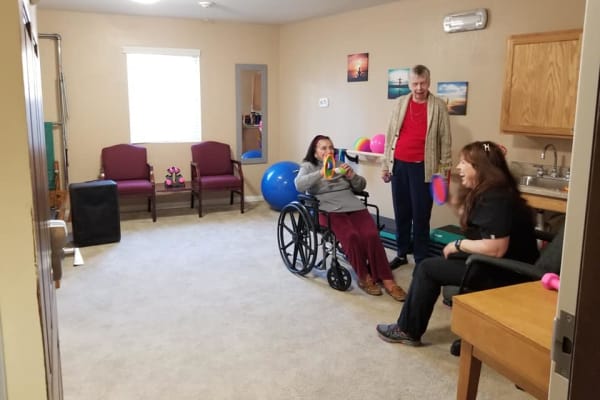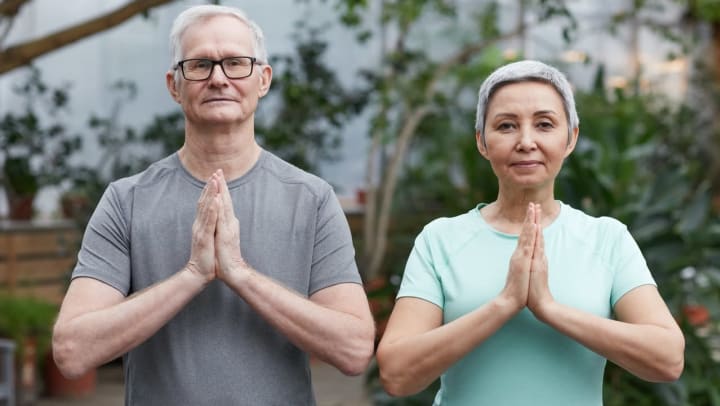How To Help Balance Issues in The Elderly
Loss of balance is a problem that many seniors will experience as they age. Unfortunately, this is a very common side effect of aging. This article will explain why balance problems in seniors occur, and provide some tips and recommendations for treatment for loss of balance in elderly.
Signs & Symptoms of Balance Issues
If you suspect an elderly individual in your life may be experiencing loss of equilibrium and other balance issues related to aging, there are a few signs and symptoms to look out for. Here are some of the most common signs of balance issues in elderly individuals:
-
Dizziness (vertigo)
-
Lightheadedness
-
Falling sensation
-
Blurry vision
-
Confused & disoriented
-
Nausea
-
Fear, anxiety
Causes of Balance Problems for Seniors
Even though loss of balance is a common occurrence for seniors and the elderly, it can be helpful to have an understanding of why this happens. There can be many causes for why seniors may experience balance problems; here are some top illnesses and developments for what causes balance issues in older adults.
-
Benign paroxysmal positional vertigo (BPPV) - BPPV is the most common cause of vertigo in adults and the elderly. It occurs when the calcium crystals in your inner ear that control your balance are dislodged from their normal positions.
-
Labyrinthitis - Labyrinthitis is an inflammation of part of the inner ear called the labyrinth, and can cause vertigo, hearing loss, and general disorientation. It’s not an incredibly common condition, but it can certainly affect seniors and contribute to a loss of balance.
-
Ramsay Hunt syndrome - Ramsay Hunt Syndrome occurs “when a shingles-like infection affects the facial, auditory and vestibular nerves near one of your ears.” It can manifest as vertigo and hearing loss, as well as pain in the ear or a feeling of weakness in the face.
-
Meniere's disease - Meniere’s disease can also affect seniors and cause a loss of balance, as well as hearing loss and a sensation of buzzing in the ears. Meniere’s disease is another relatively uncommon condition, and typically develops in individuals between the ages of 20 and 40.
In addition to these conditions, loss of balance in the elderly can also be caused by stiff or damaged joints, low blood pressure, or something more serious, like a head injury. If you are experiencing a loss of balance, or observe it in an elderly loved one, consider setting up a doctor’s appointment to get checked out.
Balance Loss Risks
Loss of balance in seniors is disconcerting, but it can also lead to greater risks, such as an increased likelihood of falling, which can lead to a greater injury. Falls for seniors can be especially damaging, since their bones, joints, and tissues are more fragile and susceptible to significant injury. Furthermore, a fear of falling can also lead many seniors to become inactive and sedentary, which presents its own set of health problems.
Treatment for Balance Loss
If a senior in your life is experiencing loss of equilibrium and balance, there are few treatment options you can consider to help them gain back some of their balance and increase their confidence. One of the best options for treatment for loss of balance in elderly is exercise.
Helpful Exercises for Balance Issues
There are many types of exercises for all ages and skill levels that can help with balance for seniors who are experiencing a loss of equilibrium. Here are some of the best exercises for seniors experiencing balance issues.
Tai Chi
Tai Chi is an ancient Chinese movement practice that offers a number of health benefits, especially for seniors. Since Tai Chi is focused on balance, flexibility, and mental connection, it can help seniors gradually improve their stability as well as their mind-body connection in a very low-impact, accessible form of exercise.
Heel-to-Toe
The heel-to-toe walking technique is a great way for seniors to improve balance and stability, and decrease the likelihood of falls. This walking technique relies upon walking slowly with a focus on rolling from the heel to the toe on each foot, to build greater contact with the floor and improve overall balance.
Standing on One Leg
The challenge of standing on one leg can be helpful for improved balance in seniors as well. Seniors can also try this exercise while holding onto a counter or a chair to increase feelings of confidence and safety.
Final Thoughts
Balance issues and an increased loss of balance is an issue that affects many seniors. It’s important to be aware of these issues so you can recognize early signs that they may be occurring in your loved ones, and encourage early adoption of treatment, such as exercise.
If you are experiencing balance issues, try out some of the exercises listed above and see how they improve your sense of balance and stability!
Balance Wellness at Ridgeline
At Ridgeline, we believe in finding the best methods to support and serve our seniors, including helping them treat and manage aging-related loss of balance. Through our comprehensive wellness programs, such as our Balance Fitness Program, we offer health-focused activities with the goal of improving overall health and wellness for our residents.
If you’re interested in learning more about Ridgeline's family of communities and our wellness programs, contact the community to learn more today.


